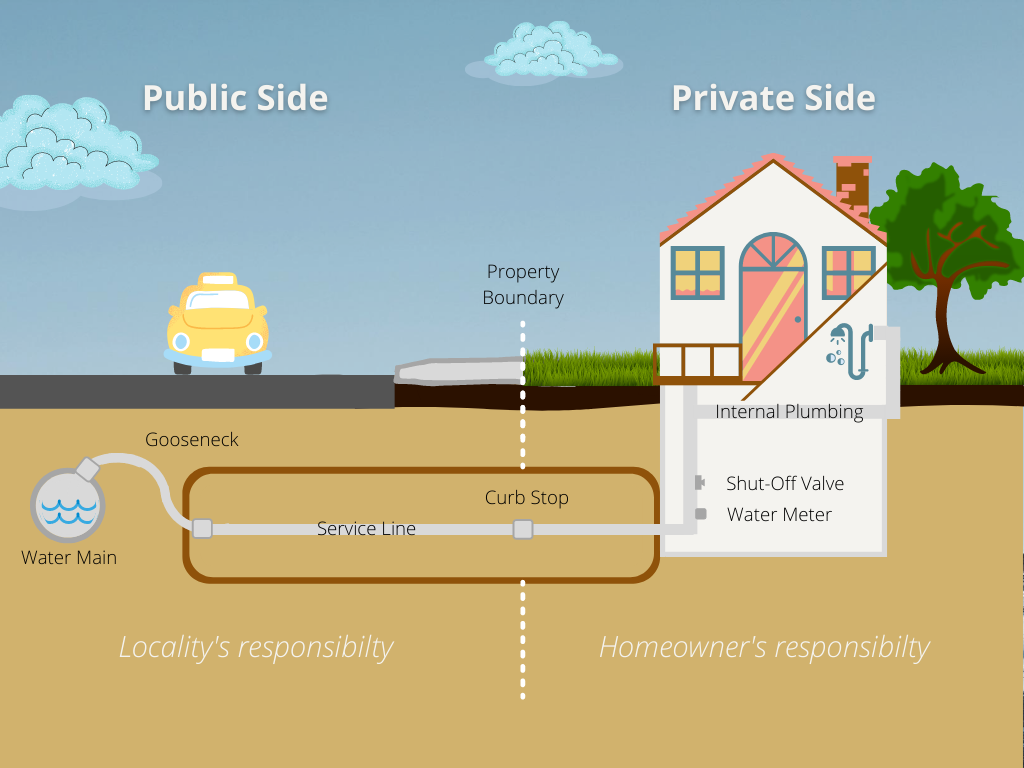
The Lead Elimination Assistance Program (LEAP) works closely with several localities and waterworks across Virginia to educate homeowners on the dangers of lead in drinking water. LEAP also offers grant funding to localities and waterworks to create and maintain Lead Service Line Replacement (LSLR) Programs. Homeowners that have lead service lines (LSLs) need to contact their water service provider for additional information on lead in drinking water. Community waterworks with identified LSLs are eligible to apply for LEAP funding to replace LSLs. Please view our Frequently Asked Questions below for more information.
Frequently Asked Questions - for Homeowners
Click on each bar below to expand and view the answers to frequently asked questions.
Below is a depiction of a water service line. There is a public side attached to the water main and a private side attached to the homeowner's property. The locality is responsible for the public side, while the homeowner is responsible for the private side. If any portion of this service line on either the public or the private side contains lead, then it would be considered a lead service line (LSL).

Lead can enter drinking water when water pipes or water service connections that contain lead wear down (corrode). Corrosion is more likely when the make-up of the water has a lower pH or a low mineral content. One of the most common problems occurs with brass or chrome-plated brass faucets and fixtures with lead solder (the material that joins metal pieces together). Lead can enter the water from these sources, especially when hot water is used.
If water pipes, plumbing or connections to water systems that contain lead corrode, a number of factors play a role in whether lead will enter the water, and if it does, how much lead enters.
These factors include:
- The pH of the water
- Type of minerals in the water
- Temperature of the water
- How long the water sits in pipes
- Whether protective coatings (“scales”) line the water pipes
Homes built before 1986 are more likely to have lead pipes, fixtures, and solder. To find out if your home’s water pipes and fixtures contain lead, contact your water utility or a licensed plumber. They can help you determine if the service line pipe that connects your home to the water main is made of lead or contains lead.
If you suspect that your drinking water contains lead, you may contact your local Field Office. The Field Office will work with you to provide more information. ODW has 6 Field Offices across The Commonwealth. You may view a list of contact information here, and you can use the map to find your nearest Field Office.
You can also send a sample of your drinking water to a private laboratory for testing. Consult the Virginia Department of General Services, Division of Consolidated Laboratory Services, to find an accredited laboratory. If your drinking water comes from a private well, the Virginia Cooperative Extension’s Virginia Household Water Quality Program has information on how to get your well water tested.
Flush your water pipes before drinking: “Flush” your pipes by running cold water until it becomes as cold as it will get. This could take as little as 30 seconds or 2 minutes or longer. This step is especially important when water from that faucet has not been used for 6 hours or more.
Only use cold water for eating and drinking: Use cold water for drinking, cooking, and especially for making baby formula. Run cold water until it becomes as cold as it can get before you use it.
Use water filters or treatment devices: Many water filters and treatment devices are certified to reduce lead in drinking water. A list of filters and treatment devices that have been certified to reduce lead can be found here: NSF International Certified Lead Filtration Devices.
Contact your water service provider: Using the contact information on your water bill, ask your water service provider for a copy of its annual Consumer Confidence Report (CCR). This report includes water quality details. In addition, be alert for any notices about water quality from your water service provider.
Of most concern is that infants and children who drink water that contains high levels of lead have more risk of having delays in their physical or mental development. Children could also develop learning problems. Adults who drink water contaminated with lead over many years could develop kidney problems or high blood pressure. The EPA website has more detailed information on possible health effects.
The Virginia Department of Health implements and enforces the federal Safe Drinking Water Act (SDWA) in Virginia. Virginia’s Public Water Supplies Law and Waterworks Regulations spell out how this is done. The law and regulations apply to public water systems, including city (municipal) and county water systems. Virginia’s regulations are consistent with the requirements of the federal Safe Drinking Water Act and EPA’s Lead and Copper Rule (LCR). The VDH Office of Drinking Water (ODW) regularly monitors these water systems.
- Lead and Copper in Drinking Water - A collection of resources compiled by the Office of Drinking Water at VDH about lead and copper in drinking water.
- Childhood Lead Poisoning Prevention Program (CLPPP) - The CLPPP at VDH provides (1) surveillance and analysis of reported blood lead levels in children less than 16 years of age, (2) education and outreach to parents, communities, and health professionals about childhood lead poisoning and prevention, and (3) oversight to providers and local health department staff on screening, testing, and case management for children exposed to lead.
If your question has not yet been answered, please feel free to contact your local Field Office or view the EPA's website for Basic Information about Lead in Drinking Water.

